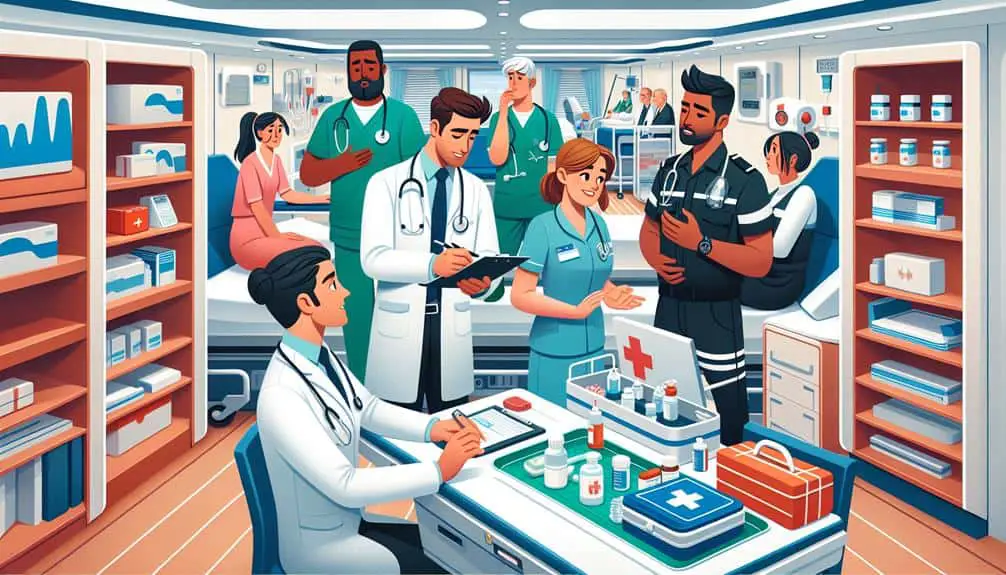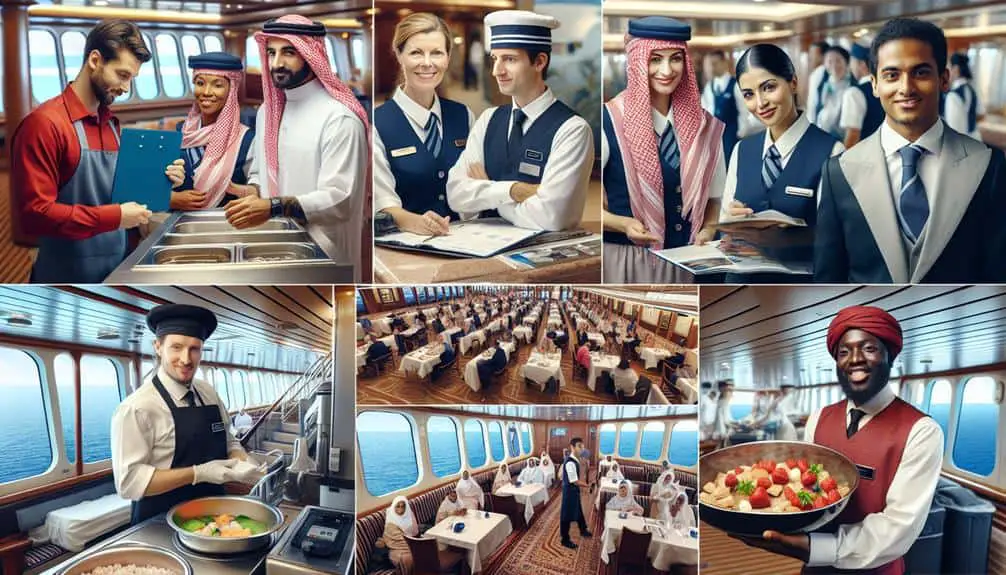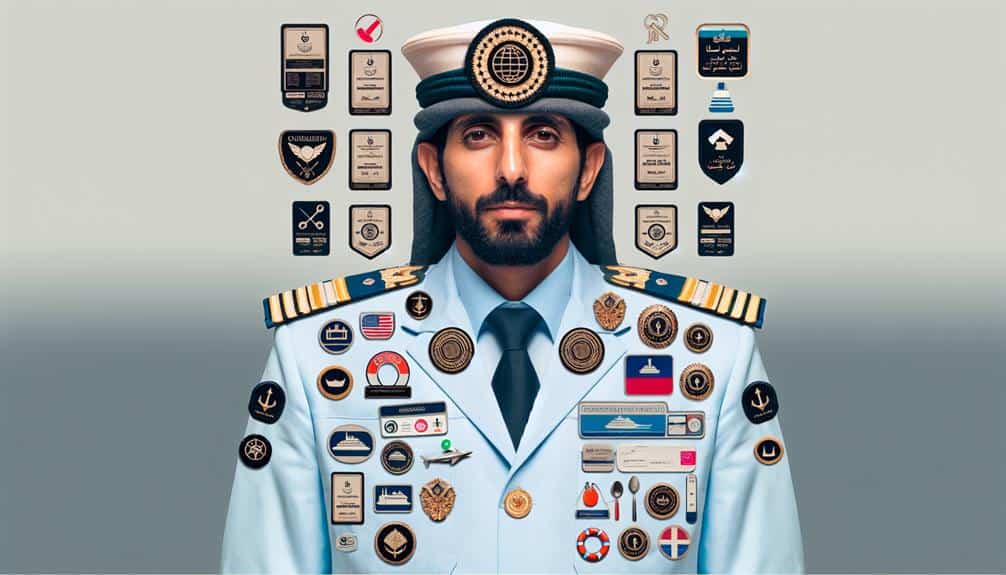On cruise ships, key medical staff roles include the Chief Medical Officer with strong emergency medicine background, Nurse Practitioner for advanced nursing care, Ship Physician overseeing medical well-being, Medical Assistant providing clinical support, and the essential Paramedic skilled in emergencies. These professionals guarantee passenger and crew health at sea with their expertise and dedication. Each role contributes uniquely to the seamless delivery of medical care and the promotion of well-being onboard. Discover how these professionals work together to make a difference in maintaining a safe and healthy environment for everyone on board.
Key Points
- Ship Physician oversees passenger and crew health with expertise.
- Nurse Practitioner provides advanced nursing care and treatment onboard.
- Paramedic manages medical emergencies and provides advanced life support.
- Chief Medical Officer leads medical teams efficiently with strong clinical skills.
- Medical Assistant supports the ship physician and ensures seamless care coordination.
Chief Medical Officer
When selecting a Chief Medical Officer for a cruise ship, prioritize candidates with extensive experience in emergency medicine and a proven track record in managing medical teams efficiently and effectively. The role of a Chief Medical Officer on a cruise ship is pivotal, requiring strong medical leadership skills and an adept understanding of team dynamics. A successful candidate should demonstrate impeccable clinical management abilities and an unwavering commitment to crisis response protocols.
In the maritime setting, the Chief Medical Officer must be prepared to handle a wide range of medical emergencies and situations. Their ability to lead a team of medical professionals with precision and expertise is essential for ensuring the health and safety of both passengers and crew members. Effective communication and collaboration within the medical team are necessary for swift and accurate decision-making in critical situations.
Moreover, the Chief Medical Officer plays an essential role in implementing and overseeing medical protocols, conducting regular training sessions, and staying abreast of the latest advancements in medical technology. A candidate with a proven track record in emergency medicine and a keen understanding of team dynamics will excel in this demanding role on a cruise ship.
Nurse Practitioner
One essential member of the medical staff on cruise ships is the Nurse Practitioner, whose role encompasses providing advanced nursing care and collaborating closely with the medical team to guarantee thorough patient care. Nurse Practitioners hold advanced practice roles, requiring a high level of expertise and autonomy in managing patient health. They're trained to assess, diagnose, and treat common illnesses and injuries, as well as to prescribe medications and create treatment plans.
Nurse Practitioners play a critical role in promoting health and preventing illness among passengers and crew members on cruise ships. Their advanced skills enable them to handle a wide range of medical issues efficiently, ensuring that individuals receive timely and effective care while at sea. By working closely with other healthcare professionals on board, Nurse Practitioners contribute to a holistic approach to healthcare delivery, enhancing the overall medical services provided onboard cruise ships. Their presence is essential in maintaining the well-being of everyone on the ship and responding promptly to any medical emergencies that may arise.
Ship Physician
The Ship Physician on a cruise vessel meticulously oversees the medical well-being of passengers and crew members, guaranteeing prompt and effective healthcare delivery at all times. As a ship physician, your role is vital in maintaining the health and safety of everyone on board. Your responsibilities include diagnosing and treating medical conditions, responding to emergencies, and providing preventive care.
Being a ship physician requires a high level of expertise and adaptability. You must be prepared to handle a wide range of medical issues, from minor ailments to serious injuries. Your ability to make quick and accurate decisions can make a significant difference in emergencies. It's essential to stay updated on the latest medical practices and technologies to deliver the best possible care.
In addition to providing medical care, you'll also be involved in promoting health and wellness among passengers and crew. This may include conducting health screenings, offering health education sessions, and advising on preventive measures. Your presence on the ship ensures that medical assistance is always available, contributing to a safe and enjoyable cruise experience for all.
Medical Assistant
Assisting the ship physician, the Medical Assistant plays a crucial role in guaranteeing the efficient delivery of healthcare services to both passengers and crew members on board the cruise ship. Medical Assistants are integral members of the medical team, providing essential support in various clinical tasks and patient care responsibilities. Here are three key aspects of the Medical Assistant role:
- Clinical Skills: Medical Assistants must possess a strong foundation in clinical skills to assist the physician effectively. This includes knowledge of medical terminology, basic procedures, and the ability to accurately document patient information.
- Patient Care: One of the primary responsibilities of a Medical Assistant is to deliver high-quality patient care. This involves interacting with patients, taking vital signs, preparing treatment rooms, and assisting with minor medical procedures under the supervision of the ship physician.
- Team Collaboration: Medical Assistants work closely with the ship physician and other healthcare staff to ensure seamless coordination of care. Effective communication and collaboration within the medical team are essential for providing excellent healthcare services on a cruise ship.
Paramedic
How important is the role of a Paramedic in ensuring the safety and well-being of individuals aboard a cruise ship? The presence of a qualified Paramedic is essential for handling medical emergencies at sea. Paramedics on cruise ships are typically required to have completed rigorous paramedic training programs and possess advanced skills in emergency medical care. Their responsibilities extend beyond basic first aid to managing critical situations, stabilizing patients, and providing advanced life support when necessary.
Paramedic training equips these medical professionals with the knowledge and skills needed to assess, diagnose, and treat a wide range of medical conditions promptly. They must be prepared to handle diverse medical emergencies, from minor injuries to life-threatening situations. In addition to responding to medical calls, paramedics play a crucial role in educating passengers and crew on health and safety practices to prevent accidents and illnesses onboard.
In essence, the role of a Paramedic on a cruise ship is indispensable in ensuring the health and safety of everyone on board. Their swift actions and expertise can make a significant difference in saving lives and providing essential medical care in a maritime setting.
Frequently Asked Questions
What Qualifications and Certifications Are Required for Medical Staff Working on Cruise Ships?
To work on cruise ships, medical staff need qualifications like an RN or MD, plus certifications in BLS, ACLS, and STCW. Training covers cruise ship healthcare protocols, procedures, and emergency response. Meeting these requirements guarantees excellent care at sea.
How Are Medical Emergencies Handled on Cruise Ships, Especially in Remote Locations?
In remote locations on cruise ships, medical emergencies are managed with precision. Telemedicine services provide remote consultation, enabling swift emergency response. Onboard procedures guarantee timely and expert care, preserving passenger safety in critical situations.
What Types of Medical Equipment and Supplies Are Typically Available in the Ship's Medical Center?
In the ship's medical center, a wide array of medical equipment is typically available, ensuring you have access to necessary supplies for emergencies. This includes items such as defibrillators, oxygen tanks, and diagnostic tools.
Are There Opportunities for Medical Staff to Receive Additional Training or Certifications While Working on a Cruise Ship?
Opportunities for training and certifications exist for medical staff on cruise ships. Continuing education enhances skills, leading to career advancement. Embrace these chances to develop professionally while providing exceptional medical care onboard. Strengthen your expertise.
How Does the Medical Staff Coordinate With Local Healthcare Facilities in Port Cities for More Serious Medical Cases?
When dealing with serious medical cases, your ship's medical staff coordinates with local hospitals through established partnerships. Emergency response protocols guarantee smooth handovers for patients in need of advanced care, maintaining high standards of treatment.




